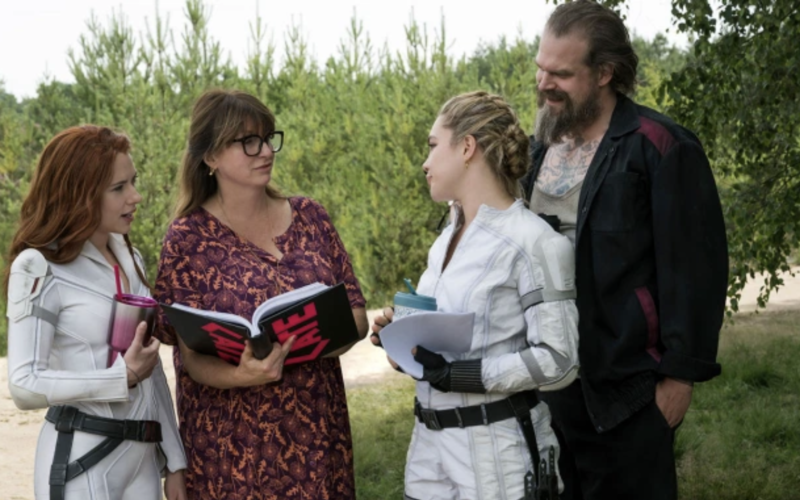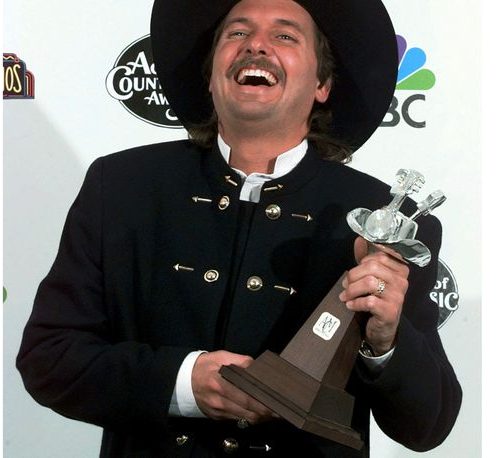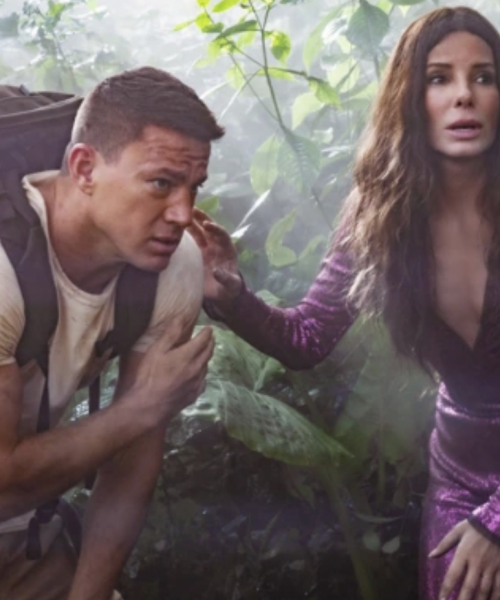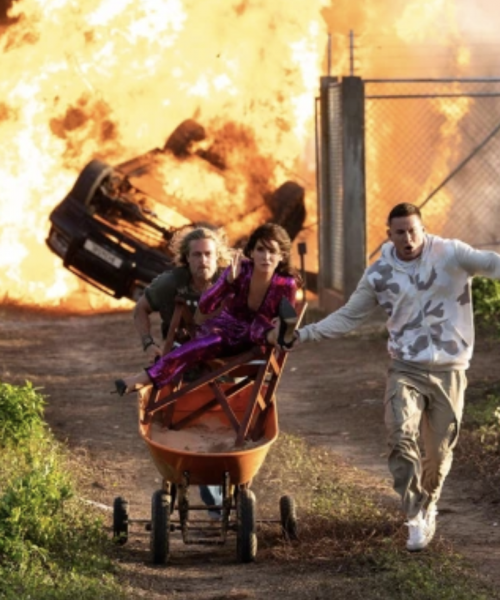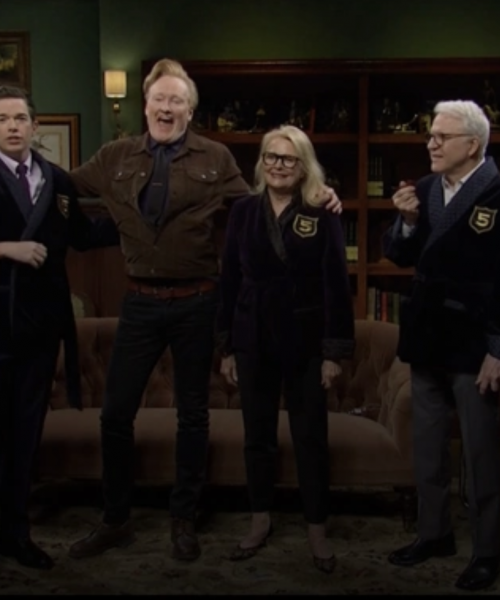BY BRIAN DAVIDS | HollywoodReporter.Com
Troy Warren for CNT
The filmmaker reveals how Scarlett Johansson convinced her to make the jump from the indie world to Marvel and how ‘Widow’ recontextualizes Natasha’s sacrifice in ‘Avengers: Endgame.’
[This interview contains spoilers for Black Widow.]
Cate Shortland initially turned down the prospect of directing Black Widow, but Scarlett Johansson refused to take no for an answer after falling in love with the Australian filmmaker’s 2012 film, Lore. From there, a Zoom-based “courtship” took place as both women got to know each other without even discussing the film. Eventually, the two creatives found common ground when it came to Widow, and Johansson became Shortland’s biggest cheerleader.
“We sent each other lists of our favorite things, like music and movies. We just wanted to know each other a little bit,” Shortland tells The Hollywood Reporter. “And because the film deals with trauma, control and violence, we could talk about stuff that’s happened to us. We could be honest with each other and have a laugh as well. But then, as a producer… she would push me to be myself and to always make the choices that I wanted to make. She held my hand the whole way. She’s this really beautiful creature, but she’s also this really down-to-earth, no-bullshit person.”
Since Black Widow’s MCU introduction in 2010’s Iron Man 2, bits and pieces of Romanoff’s tragic and horrific backstory have been revealed including the Red Room’s Black Widow program that brainwashed her and molded her into the world’s deadliest assassin. During a conversation with Loki in 2012’s The Avengers, Romanoff memorably referenced the “red in my ledger,” which signified the many atrocities she’d committed along the way. Based on those threads alone, a Black Widow movie could’ve been the MCU’s darkest entry yet, but Shortland wanted to subvert that assumption.
“I think the expectation was that we would make a dark film, and I didn’t want to do that,” Shortland explains. “When I spoke to Marvel, I said, ‘I want to make a fairground ride, but I want it to have a lot of heart.’ I wanted people to be uplifted and feel love and empathy for each other. And Natasha’s journey in this is that she begins by feeling like a pretty horrible person, and it’s the people around her that make her see both the truth of what she’s done and they make her answer to what she’s perpetrated on others. And then they say to her, ‘Yeah, you did that, but you were part of this system. And to move forward, you have to forgive yourself.’”
Shortland and Johansson also believe that Romanoff’s sacrifice in Avengers: Endgamewouldn’t have been possible without Natasha’s effort to reconcile her past in Widow.
“By the end of the film, she’s kind of a whole person again; she’s kind of rebuilt herself,” Shortland says. “And that allows her to sacrifice herself in Endgame. Scarlett says, ‘We know she’s sacrificing herself with resolve. There’s no unanswered questions about what she’s done.’”
In a recent conversation with THR, Shortland also discusses her first meeting with Marvel and how she requested Florence Pugh for the role of Yelena Belova without even seeing a script. She also addresses the film’s post-credit scene including her admiration for Julia Louis-Dreyfus.
You’ve said that you had reservations about directing this film until Scarlett Johansson reached out via Zoom. What came out of those discussions in terms of the best path forward?
When we initially spoke about the film, we talked about heart and emotion. We wanted Natasha to go on an epic journey, but the epic journey was both physical and internal.
Scarlett served as both lead actor and executive producer. What was your working relationship like in terms of each hat she had to wear?
We started off courting each other very quietly by Zoom and without speaking too much about me doing the film. It was just us getting to know each other. We sent each other lists of our favorite things, like music and movies. We just wanted to know each other a little bit. And because the film deals with trauma, control and violence, we could talk about stuff that’s happened to us. We could be honest with each other and have a laugh as well. But then, as a producer, she became my greatest cheer squad. She would push me to be myself and to always make the choices that I wanted to make. She held my hand the whole way. She’s this really beautiful creature, but she’s also this really down-to-earth, no-bullshit person.
Black Widow is your first massive studio film. How did the experience compare to your initial expectations?
I thought it would be really different. I thought that there would be a lot more restrictions or rules. Even though we had this massive structure, Marvel really went out of their way to make sure that when we were on set, it felt really intimate and really relaxed. What’s beautiful is there’s always room to improvise. Rachel Weisz says the same thing, but it kind of felt like an arthouse film on set. The huge difference is you shoot for four-and-a-half months, and the exhaustion of that is really telling on me, the crew and the actors. The other incredible thing is the amount of trust that you have to have because you’re working with such artists like visual effects, the choreographers, stunt performers and Darrin Prescott, who was my second unit director. So you really have a fantastic team.

Casting Florence Pugh is always a wise decision, and your film proved that once again.
(Laughs.) The first time I met Kevin, Victoria [Alonso] and Lou [D’Esposito], they asked me who I’d like to work with if I was to do the film. I hadn’t read any scripts or anything; it was just, “Which actors are you excited by?” And Florence was the first person I mentioned. I’d seen Lady Macbeth a couple of times, and I really wanted to work with her. And then I met her in London with Brian Chapek, my producer, and we just got on really well. By putting her with Scarlett, I knew that Scarlett would have someone on screen with her that could match her energy. But what we didn’t know at that stage was that Florence had been a dancer. So it made the fight sequences so much more dynamic because she can handle the choreography. And when they were fighting in the apartment, you’ve got this really balletic, athletic stuff happening between the two of them because of Florence’s experience with dance.

For a film about child trafficking, Black Widow could’ve been a much darker movie with a rather significant body count. So I really appreciated the humanity that was shown towards the opposition, which mostly consists of women who are just like Natasha and Yelena. What led you to this choice?
I think the expectation was that we would make a dark film, and I didn’t want to do that. When I spoke to Marvel, I said, “I want to make a fairground ride, but I want it to have a lot of heart.” I wanted people to be uplifted and feel love and empathy for each other. And Natasha’s journey in this is that she begins by feeling like a pretty horrible person, and it’s the people around her that make her see both the truth of what she’s done and they make her answer to what she’s perpetrated on others. And then they say to her, “Yeah, you did that, but you were part of this system. And to move forward, you have to forgive yourself.” So by the end of the film, she’s kind of a whole person again; she’s kind of rebuilt herself. And that allows her to sacrifice herself in Endgame. Scarlett says, “We know she’s sacrificing herself with resolve. There’s no unanswered questions about what she’s done.”
Regarding the post-credit scene, did Julia Louis-Dreyfus actually have a cold on the day? If so, did you have to write it into the scene as allergies?
No, that was just Julia being fantastic and being a raw, amazing creature and actress.
Wow, that’s the best cold/allergy acting I’ve ever seen.
(Laughs.) That day, I basically just watched her and did a little bit of hero worship. And then she left.
***
Black Widow is now available in theaters nationwide, as well as on Disney+ Premier Access.
In Other NEWS


























